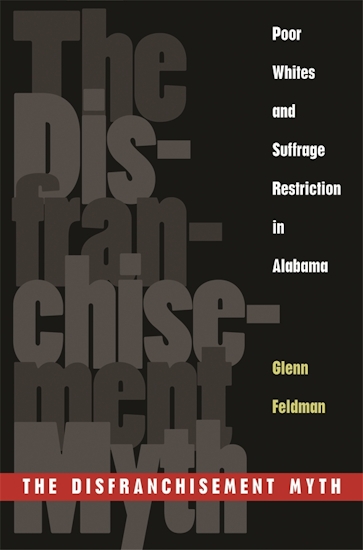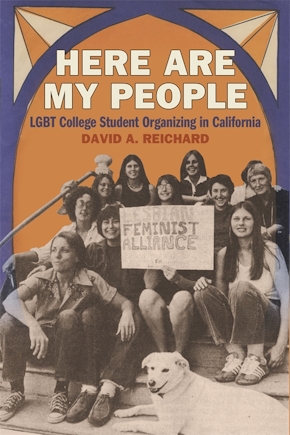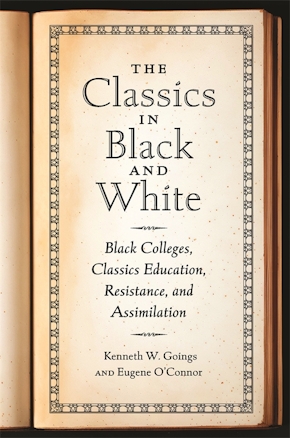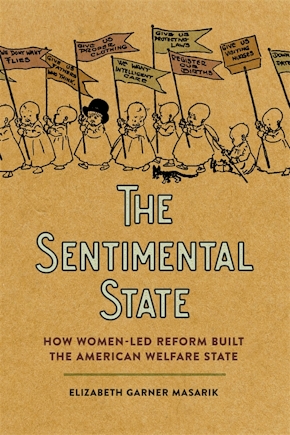The Disfranchisement Myth
Poor Whites and Suffrage Restriction in Alabama
Title Details
Pages: 328
Trim size: 6.000in x 9.000in
Formats
Paperback
Pub Date: 04/15/2010
ISBN: 9-780-8203-3510-0
List Price: $34.95
Related Subjects
The Disfranchisement Myth
Poor Whites and Suffrage Restriction in Alabama
Skip to
- Description
- Reviews
- Awards
This study challenges decades of scholarship on the roots of disfranchisement in America, arguing that historians have misunderstood the role of race and class in this antidemocratic movement. In 1901 Alabama adopted a new state constitution intended to strip its black citizens of their voting rights. Alabama was not the only state that disfranchised blacks; however, it was the only one where the issue was put to a popular vote by referendum. Glenn Feldman looks anew at the causes and consequences of this landmark event to revise the misleadingly neat view that historians have handed down to us.
Drawing on court documents, voting statistics, civil rights and labor records, and many other sources, Feldman shows that the racist appeals of Alabama’s white planters, industrialists, and other conservatives motivated poor whites in far greater numbers and for more complex reasons than received knowledge concedes. The seemingly natural allies of blacks, poor whites constituted most of the white opposition to disfranchisement, says Feldman. Yet the number of poor whites who backed the new constitution was greater. Ultimately, many would be disfranchised by the very measures they had believed were aimed only at blacks. In that sense, says Feldman, poor whites were “more parties to their own demise than the mere victims of circumstance.”
Such conclusions run counter to those associated with historians J. Morgan Kousser, C. Vann Woodward, and others. Giving new emphasis to race preoccupations where these scholars had focused on class divisions, Feldman reveals the vitally important role that emotion has played in influencing the political behavior of white southerners—often to their profound political and economic detriment. The Disfranchisement Myth has much to say about the tendency of “plain” people in the South—then and now—to allow prejudice and fear to distract them from the pursuit of their rational political interests.
Feldman's thinking is clear, and his research is extremely impressive. This is good stuff.
—Sheldon Hackney, author of The Politics of Presidential Appointment: A Memoir of the Culture War
Feldman has uncovered important evidence about the cross-class character of the disfranchisement campaign in Alabama. Making extensive use of small-town newspapers and manuscript collections, The Disfranchisement Myth documents in detail the resurgence of racism that followed on the heels of the Populist defeat, a resurgence that had a devastating impact on the horizons of black politics and the potential for common whites to rise above the ideological boundaries marked out by white supremacy.
—Brian Kelly, author of Race, Class, and Power in the Alabama Coalfields, 1908-21
Feldman presents a compelling critique of the prevailing historical analysis—advanced by C. Vann Woodward and others—that poor whites were decidedly resistant to the introduction of disfranchisement measures in the American South in the final years of the nineteenth century and the early twentieth-century. . . . Feldman's work becomes essential for students of the politics of the South in this era.
—Choice
[A] deeply researched, well-written book . . . valuable as a study of the way political culture and local alliances worked in the face of conflicting social and political needs. . . . Feldman writes with passion and clarity. . . . The book serves as a useful corrective to the notion that most poor whites opposed disfranchisement.
—American Historical Review
This book is thoroughly researched, powerfully argued, and generally well written.
—Arkansas Historical Quarterly
This study is a well-written and thoroughly documented corrective to overstatements by some historians.
—Alabama Review
[A] superb monograph . . . This is an important and deeply depressing study, and despite its restricted subject matter will become a standard reference on early twentieth-century southern race relations.
—American Studies
Winner
Outstanding Academic Title, Choice magazine



